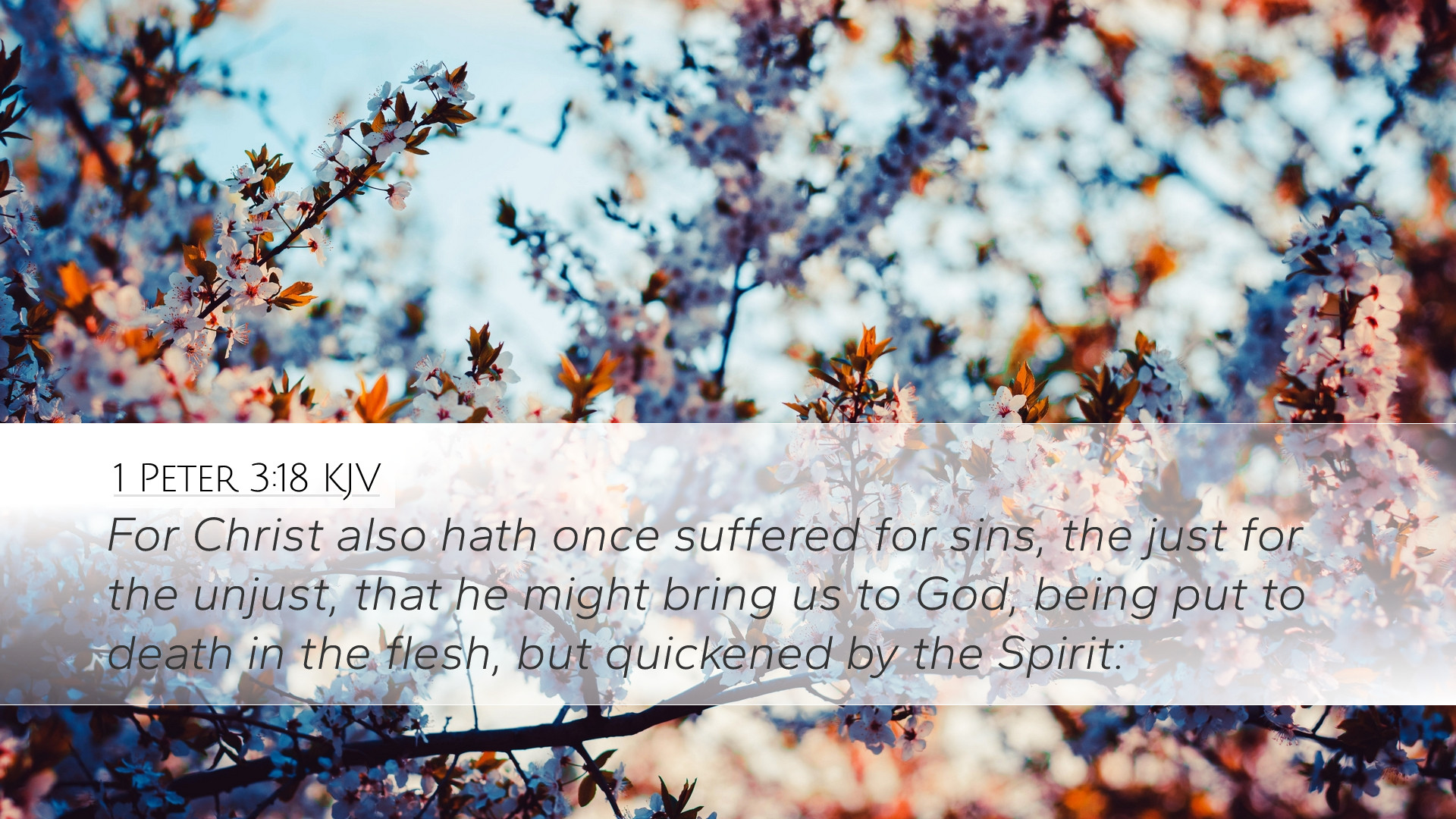Old Testament
Genesis Exodus Leviticus Numbers Deuteronomy Joshua Judges Ruth 1 Samuel 2 Samuel 1 Kings 2 Kings 1 Chronicles 2 Chronicles Ezra Nehemiah Esther Job Psalms Proverbs Ecclesiastes Song of Solomon Isaiah Jeremiah Lamentations Ezekiel Daniel Hosea Joel Amos Obadiah Jonah Micah Nahum Habakkuk Zephaniah Haggai Zechariah Malachi1 Peter 3:18
1 Peter 3:18 KJV
For Christ also hath once suffered for sins, the just for the unjust, that he might bring us to God, being put to death in the flesh, but quickened by the Spirit:
1 Peter 3:18 Bible Commentary
Commentary on 1 Peter 3:18
The verse 1 Peter 3:18 states: "For Christ also suffered once for sins, the just for the unjust, that He might bring us to God, being put to death in the flesh but made alive by the Spirit." This passage serves as a theological cornerstone in understanding the salvific work of Christ, His suffering, and the implications for believers.
Exegesis and Context
In order to fully comprehend this verse, it is essential to consider its context within the epistle. Peter addresses suffering, encouraging believers facing persecution to find solace in Christ's own suffering. He portrays Christ as an example of patient endurance and ultimate deliverance.
Insights from Matthew Henry
Matthew Henry emphasizes the profound nature of Christ's suffering, noting that it was intentional and sacrificial. He remarks that Christ "suffered once for sins", highlighting the singularity and sufficiency of Christ's atonement. Henry stresses the concept of substitution, where the just (Christ) bore the burden of the unjust (humanity).
Furthermore, Henry elucidates the purpose of Christ's suffering: "that He might bring us to God." This denotes a reconciliatory work, where through Christ's suffering, believers gain access to a holy God. The terminology used indicates a movement from estrangement to acceptance, emphasizing the importance of the Cross in the redemptive narrative.
Insights from Albert Barnes
Albert Barnes provides a detailed analysis of the phrase "put to death in the flesh but made alive by the Spirit." Barnes interprets this as a reference to the duality of Christ's existence. He notes that while Christ's mortal body experienced death, His divine nature remained active in His resurrection.
Barnes also highlights the role of the Holy Spirit in Christ's resurrection, positing that it was the Spirit that empowered Jesus, demonstrating a profound truth about the nature of resurrection for believers. His commentary points to the assurance of life after death, linked intimately with Christ's victory over the grave, an essential theme for encouragement to the persecuted church.
Insights from Adam Clarke
Adam Clarke takes a systematic approach, diving into the significance of "once for sins." He explains that this phrase indicates the completeness and finality of Christ’s atonement, negating the need for repeated sacrifices, which were part of the Old Covenant. This theological transition from the Old to the New Covenant is crucial for understanding the nature of salvation.
Clarke further elaborates on the implications of Christ's suffering, arguing that believers are called to emulate this suffering. The phrase "that He might bring us to God" underscores the transformative power of Christ's work, instigating a paradigm shift in how the early Christians viewed both their suffering and their faith.
Theological Implications
The theological implications of 1 Peter 3:18 are significant for contemporary Christian thought. The verse encapsulates the essence of the Gospel: Christ's suffering is not an end but a beginning, paving the way for restoration and reconciliation with God. The notion of vicarious suffering presents a profound truth—they point out that through Christ, believers now stand justified before God, devoid of condemnation.
This passage invites pastoral reflection on the nature of suffering. In a world rife with trials, understanding that Christ experienced ultimate suffering for the sake of humanity offers a source of consolation for believers. It empowers them to face their own suffering with courage and hope, knowing that they partake in a redemptive suffering that leads to glory.
Practical Applications
- Encouragement in Suffering: Pastors can draw from this verse to provide comfort to congregants undergoing distress, assuring them of the truth that Christ also suffered and was ultimately vindicated.
- The Foundation of Salvation: Students and theologians can utilize this verse to build foundational teachings for discipleship, emphasizing the necessity of Christ’s sacrifice and the assurance it brings to believers.
- Holistic Understanding of the Gospel: Emphasizing the death and resurrection in tandem cultivates a full understanding of the Gospel. The resurrection is not a mere addendum but a pivotal element that reassures believers of their own future hope.
Conclusion
1 Peter 3:18 serves as a profound reminder of the cost of salvation and the grace of reconciliation. By examining the insights from prominent commentaries, we uncover the layered meaning of Christ’s suffering—not as an isolated event, but as a pivotal component of God’s redemptive plan.
As this verse is unpacked within the lives of believers and taught within the church, it carries the weight of transformative potential. The recognition of suffering, both of Christ and the believer, shapes a faith that is resilient and anchored in the hope of eternal life.


